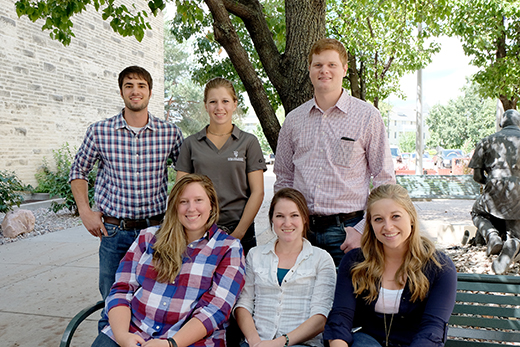 Summer vacations usually involve travel and sightseeing, but for six Kansas State University veterinary students, their summer was spent visiting 74 feedlots in Kansas to provide a special feedlot assessment service.
Summer vacations usually involve travel and sightseeing, but for six Kansas State University veterinary students, their summer was spent visiting 74 feedlots in Kansas to provide a special feedlot assessment service.
The students were selected and trained by Dan Thomson, Jones professor of production medicine and epidemiology in the university’s College of Veterinary Medicine, who is working in collaboration with the Kansas Livestock Association, the Kansas Beef Council and National Cattlemen’s Beef Association on a Beef Quality Assurance, or BQA, assessment project.
“Beef Quality Assurance is a process involving an educational component where producers can be individually certified and the principles of implementation can be verified through an on-site assessment,” Thomson said. “Our college conducted a similar project in 2012 with Dr. Tera Rooney-Barnhardt, who was then a student. This summer we recruited six students, who then took the project on as a team. They were real entrepreneurs who ran this project like it was a veterinary practice.”
“We were happy to collaborate with Dr. Dan Thomson, K-State College of Veterinary Medicine and six outstanding interns to offer these BQA assessments for our hard-working producers and feeders,” said Kevin Thielen, executive director of the Kansas Beef Council. “The BQA program is an opportunity for the entire industry, from cow-calf producer to feedlot manager, to unite behind a common goal and a commitment to quality and sustainability. Guided by accepted scientific knowledge and common sense animal handling protocols, Kansas producers ensure that no matter how long a cow is under their care, that it is raised humanely and responsibly. This partnership is just one of the many examples of how producers and feeders work collaboratively with licensed veterinarians to ensure a safe, healthy and humanely raised product for the modern consumer.”
“The BQA program is foundational in helping train cattlemen to use proven cattle care and handling techniques that results in high quality beef,” said Josh White, executive director for producer education for the National Cattemen’s Beef Association. “I am extremely pleased that the BQA program was able to partner with K-State veterinary students to assist feed yards across Kansas in conducting BQA feed yard assessments. The commitment of these students is impressive and is demonstrated by the number of feed yards assessed or re-assessed in a short window of time.”
The following Doctor of Veterinary Medicine students served as interns for the project:
Samantha Boyajian, second-year veterinary student, Gardner; Matthew Temaat, third-year veterinary student, Manhattan; Miles Barber, second-year veterinary student, Marysville; and Isabelle Withrock, second-year veterinary student, Wichita.
From out of state: Joyce Wick, second-year veterinary student, Sidney, Montana; and Kathleen Flanagan, second-year veterinary student, Dallas, Texas.
“We were just like entrepreneurs,” Boyajian said. “We jumped into this project, working together with the producers. It was truly a hands-on experience working with people who care as much as you do and seeing how they work every day. As a learning experience, it was much more than you can get out of a classroom.”
Withrock said the group ended up cold-calling every feedlot in Kansas to see if they wanted to participate.
“The first calls were scary, but you learn how to talk to producers, about how to talk about their operations and you learn how producers feel about the BQA program,” she said. “Many are already BQA-certified and they were real excited about the opportunity for getting more involved in the program. It was mutually beneficial for us students and for the producers.”
The assessments were scheduled in June and July. The students worked in teams and later individually, which allowed them to visit more feedlots on a daily basis.
“You have to get your foot in the door first,” Boyajian said. “Once you had confidence in what you were doing, one person went to conduct the assessments. We would visit one lot a day, and be gone for four days or so.”
“A couple of places already have their veterinarian performing assessments,” Withrock said. “We worked with them almost like a trial run, to get it more widespread and more well-known. BQA assessment is easy to follow, whether as a veterinarian, student or as a producer. You can take the guidelines as a veterinarian and apply it to your clients, so I think it will be easy enough for veterinarians to start implementing on a more widespread basis.”
Thomson anticipates working with another group of students to conduct assessments next summer, but said that producers and veterinarians can learn more about the process on their own. He also said the National Cattlemen’s Beef Association hosts a national BQA feed yard assessment database, with information posted at beefresearch.org/beefissuesquarterly.aspx?id=4828.
“This database is protected from freedom of information requests and is a private list for packers/retailers; feedlots must give permission to be placed on the list,” Thomson said. “These assessments do not need to be conducted by our group. If a veterinarian is doing them for a feedlot, then we recommend asking to see if feedlot would like to be placed on the list.”
Source: Joe Montgomery, K-State News